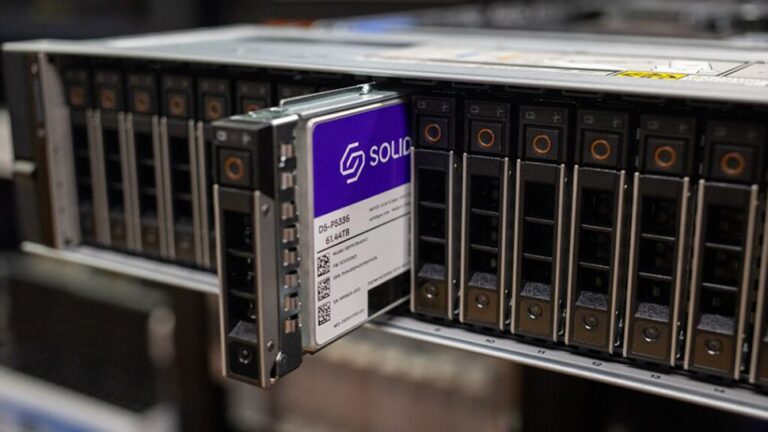StorageReview engineers have broken their own world record by calculating pi with a staggering 202,112,290,000,000 digits, shattering their previous record of 105 trillion digits set earlier this year in time for World Pi Day (March 14-March 14).
The previous record, the team’s second attempt, was achieved using a dual-processor 128-core AMD EPYC 9754 Bergamo system with 1.5TB of DRAM and nearly a petabyte of Solidigm QLC SSDs. For this attempt, the team opted for two Intel Xeon 8592+ processors and 28 Solidigm P5336 NVMe SSDs with 61.44TB.
The challenge was to use a Dell PowerEdge R760 with a 24-bay NVMe Direct Drives backplane and an internal PCIe switch to enable simultaneous communication between all NVMe drives without requiring additional hardware or RAID devices. The configuration was further customized by integrating a PCIe riser from multiple R760s for additional NVMe SSDs and enhancing it with larger heatsinks from another R760 to maximize turbo-boost capability.
Third time’s a charm
While the previous attempt was marred by bugs, performance issues, and memory and storage constraints, things went much smoother this time around.
“Not only did the Solidigm drives and Dell PowerEdge R760 work together flawlessly, but the nearly hands-off nature of this new record was a welcome change from the perils of our last record attempt,” said Kevin O’Brien, StorageReview lab manager.
“After what we experienced in the last test at 105, I’m happy that we chose the platform that we chose for the big record,” he continued.
The team used the y-cruncher application and the Chudnovsky algorithm for the computation, which ran continuously for 85 days (total computation time was 100.673 days) and consumed nearly 1.5 PB of the total available 1.720 PB of data storage.
“This new Pi world record is an exciting achievement, as this compute workload is as intense as most AI workloads we see today,” said Greg Matson, vice president of Solidigm’s Data Center Storage Group. “We are thrilled to have had the opportunity to enable another record attempt to compute Pi with our partners at Dell Technologies and the experts at StorageReview.”
The remarkable calculation of 202 trillion digits of pi is a historic achievement, pushing the boundaries of computational mathematics even further, but we have a sneaking suspicion that this won’t be StorageReview’s last attempt at tackling this challenge.


